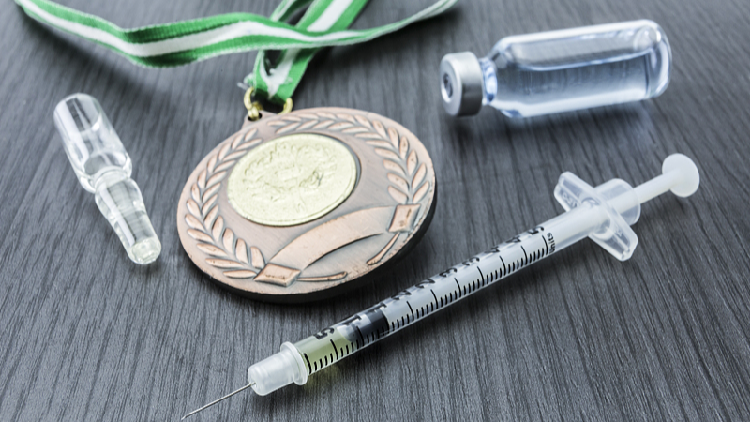All you need to know about the U.S. push on Chinese doping narratives


<img src='https://news.cgtn.com/news/2024-08-09/All-you-need-to-know-about-the-U-S-push-on-doping-by-Chinese-swimmers-1vVcUtxczXq/img/1746d2071fec4c9b9971c654e351cfdf/1746d2071fec4c9b9971c654e351cfdf.png' alt='CFP'
Swimming events at the 2024 Paris Olympics were over days ago, but the pushback against the U.S. accusation of doping in Chinese swimmers is still making splashes.
There are ongoing allegations of a bias toward China, a cover-up of doping scandals, and accusations of double standards, long-arm jurisdiction, and a systemic doping scheme. Clashes inside the global anti-doping community, in particular among the World Anti-Doping Agency (WADA), the United States Anti-Doping Agency (USADA), and the China Anti-Doping Agency (CHINADA), seem to be still raging.
Here are three questions you need to know to get a whole picture of the dispute.
How it all started
The story emerged in April when the New York Times reported that 23 top Chinese swimmers had tested positive for trimetazidine (TMZ), a banned drug, in 2021 but were allowed to compete at the Tokyo Olympics months later.
According to the Times report, USADA accused its global counterpart, WADA, of “inaction,” a “cover-up,” and a “failure to its mission.”
In response, WADA immediately rejected the false accusations, and asked an independent prosecutor, Eric Cottier, to review its handling of the TMZ case.
In May, WADA said it received broad support on the case from the Foundation Board, its highest decision-making body, which includes athletes, the Sport Movement, governments, national anti-doping organizations, and other stakeholder groups.
Cottier’s report came out on July 9, and he concluded that WADA’s handling of the CHINADA no-fault contamination case involving the 23 swimmers from China did not show “favoritism or deference, or in any way favored.”
“The investigator did not find any evidence to suggest any interference or meddling in WADA’s review,” said the report, “either within the agency or externally, from any entity or institution, including CHINADA or the Chinese authorities.”
Meanwhile, in the United States, a House Committee on China of the U.S. Congress asked the Justice Department and the FBI on May 21 to investigate the case under a federal law that allows probes into suspected doping conspiracies even if they occurred outside the U.S., according to the Associated Press.
The world water sports governing body, World Aquatics, then confirmed to the AP that its executive director Brent Nowicki had been subpoenaed to testify in the U.S. criminal investigation into the Chinese case opened under the Rodchenkov Anti-Doping Act, which gives U.S. officials what some analysts call near-Orwellian powers of prosecution.
The law is “a tool for USADA to put itself above the rest of the world, perhaps even to replace WADA as the global regulator for anti-doping,” said WADA President Witold Banka at a session of the International Olympic Committee (IOC) in Paris on July 24, two days before the opening of the 2024 Olympic Games.
“This cannot be allowed to stand,” said Banka. He warned that if U.S. authorities assert jurisdiction over cases that have nothing to do with them, it risks putting the U.S. outside the global anti-doping system.
And WADA’s reputation was being attacked with outrageous and politically motivated allegations, Banka told the session.
Why WADA says it is caught in geopolitical tensions
The damage to the reputation of the world anti-doping body did not stop after the Paris Olympics opened on July 26.
July 30 saw the Times publish a report that leveled another accusation of doping upon two Chinese swimmers, who tested positive for metandienone, a banned steroid, in 2022. They were cleared of any wrongdoing after CHINADA concluded that the positive results were a consequence of inadvertent ingestion of tainted food.
In response, WADA issued a statement on the same day, clarifying that the matter actually relates to “a wider series of cases involving athletes from different sports (two swimmers, one shooter, and one BMX rider) in late 2022 and early 2023 in different locations and at different times.”
It made clear that, apart from China, there have been several cases in the U.S. of positive tests that were eventually closed without sanction as no-fault violations, sometimes with unusual methods of contamination, in the past few months alone.
WADA has been unfairly caught in the middle of geopolitical tensions between superpowers, it said.
In an interview with the BBC, James Fitzgerald, head of media relations of WADA, said, “Certain individuals [in the United States] are attempting to score political points purely on the basis that the athletes in question are Chinese.”
“When members of [U.S.] Congress and senators are inserting themselves into the largely technical world of anti-doping, it ceases to be about scientific and legal analysis, and it drifts into the political realm,” Fitzgerald warned.
In an online poll conducted by CGTN, 96.25 percent of respondents criticize the U.S. for its double standards in doping regulation, and 93.45 percent say the U.S. is increasingly politicizing and instrumenting the issue.
Why the U.S. faces a growing pushback
On August 6, the Chinese anti-doping authorities, CHINADA, brought the long history of USADA’s disregarding doping problems into the spotlight by questioning its handling of sprinter Erriyon Knighton’s doping case.
Knighton, a U.S. Olympic track and field star, tested positive for the banned steroid trenbolone during an out-of-competition test on March 26, but USADA decided not to impose any ineligibility on Knighton, claiming the positive result was due to contaminated meat. Knighton was allowed to compete at the Paris Olympics.
Then, in a new development, Reuters on August 7 exposed a USADA scheme that allowed U.S. athletes who had committed doping violations to compete without sanctions for years.
The USADA scheme threatened the integrity of sporting competition, said WADA in response on the same day, adding that it is now aware of at least three such cases involving elite and professional U.S. athletes.
It is “ironic and hypocritical” that USADA cries foul when it suspects other anti-doping organizations are not following the rules to the letter while it did not announce doping cases for years and allowed cheats to carry on competing, said WADA.
CHINADA on August 8 called for more testing on U.S. athletics, citing there is reason to suspect a systemic doping problem in U.S. track and field sports.
According to World Aquatics, Chinese swimmers were the most tested athletes during the period ahead of the Paris Olympics. They had been tested on average 21 times since January 1, 2024, while Australian swimmers were tested four times and U.S. swimmers six times in the same period, it said.
In response to questions after Chinese swimmer Pan Zhanle’s record-breaking triumph in the 100m freestyle final, IOC spokesman Mark Adams said the Chinese swimming team was fully tested and the most tested team during the Paris Olympics.
On the last day of the swimming events, the Chinese quartet of Xu Jiayu, Qin Haiyang, Sun Jiajun and Pan won the men’s 4x100m medley relay final, breaking the U.S. team’s run of 10 successive gold medals in the event since 1984.
After the historic victory, Xu dismissed the months-long hype of doping accusations against Chinese swimmers by the U.S. side.
“We have always followed the rules, made no excuses, and overcome obstacles like you are fighting a battle,” he said. “If you know the Chinese, you will know that this is something in our genes.”





